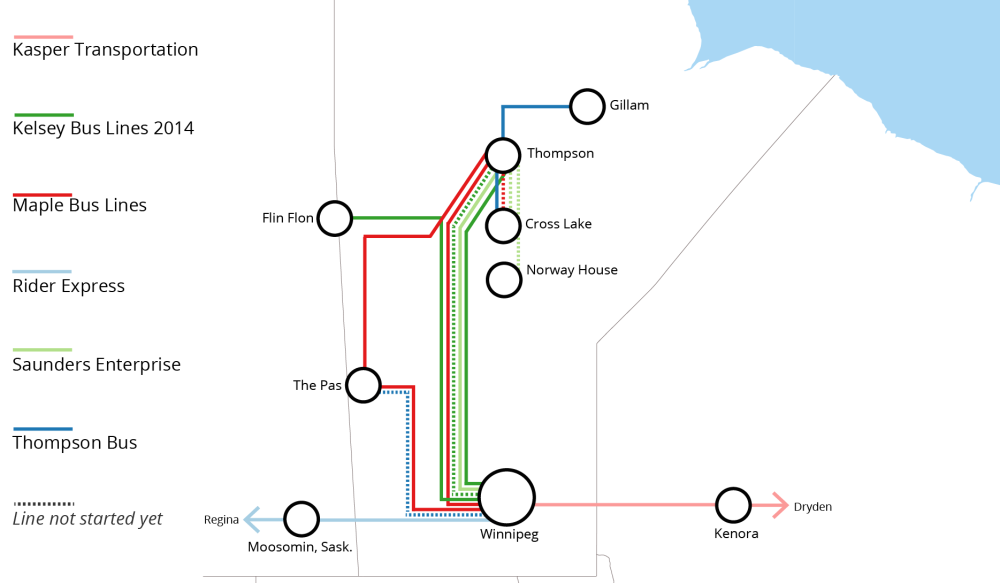Regional bus lines rush to replace Greyhound’s Manitoba routes
Advertisement
Read this article for free:
or
Already have an account? Log in here »
To continue reading, please subscribe:
Monthly Digital Subscription
$19 $0 for the first 4 weeks*
- Enjoy unlimited reading on winnipegfreepress.com
- Read the E-Edition, our digital replica newspaper
- Access News Break, our award-winning app
- Play interactive puzzles
*No charge for four weeks then billed as $19 plus GST every four weeks. Offer only available to new and qualified returning subscribers. Cancel any time.
Read unlimited articles for free today:
or
Already have an account? Log in here »
Hey there, time traveller!
This article was published 31/10/2018 (2255 days ago), so information in it may no longer be current.
OTTAWA — Manitobans will be able to travel this week on all the bus routes Greyhound stopped serving Wednesday night, according to a survey of six businesses that have stepped in.
On Wednesday, the Pallister government dismissed the federal government’s plans for cost-sharing with affected provinces to temporarily subsidize routes the private market hasn’t filled.
The province told the Free Press Wednesday that two regional Greyhound routes — Flin Flon to the Pas and Minnedosa to the Saskatchewan border — would be abandoned.

But it appears that all of the Manitoba routes that had Greyhound service have already been replaced. In fact, some routes the company abandoned years ago are being restored.
As of Thursday, Saskatchewan-based Rider Express is operating the Trans-Canada Highway route from Calgary to Winnipeg, and Ontario-based Kasper Transportation Service is following the highway to Thunder Bay.
Beginning Friday, three companies will travel the Winnipeg-Thompson route that serves communities along Highway 6 and Winnipeg-destined travellers from northern locations who get to Thompson by air or via winter ice roads.
A fourth bus line plans to add service along that route, as well.
Three different companies will provide service from Thompson to Cross Lake First Nation; one of them will extend service to Norway House Cree Nation.
Maple Bus Lines is travelling between The Pas and Thompson, a route Greyhound abandoned six years ago.

Thompson Bus currently serves passengers travelling northeast to Gillam. It is carrying cargo northwest to Lynn Lake now, and plans to have passenger service to that community sometime early next year for the first time since 2012.
It is not immediately clear how the frequency of these routes aligns with recent Greyhound service; the company removed virtually all scheduling information from its website prior to Wednesday’s pullout from the Prairies.
Ticket prices on the new routes appear to be generally comparable with recent Greyhound prices. In some cases, Greyhound charged more on popular routes to cover the cost of serving other routes mandated by the province in order to maintain a licence to operate in Manitoba.
Some of the alternatives use 15-passenger vans, saving on fuel and maintenance costs compared to operating the motor coaches Greyhound had on the road.
Greyhound announced on July 9 it would end service on all but one of its routes in Western Canada and in northern Ontario, effective Oct. 31. A month ago, Ottawa rejected a proposal spearheaded by Premier Brian Pallister to have the federal government pay Greyhound to extend service by at least 60 days to allow more time for local and regional businesses to take over.
Across the Prairies, 87 per cent of Greyhound routes have been replaced other transportation companies. A patchwork of gaps persists in both British Columbia and Alberta, largely clustered around the Rockies.
Thompson, which contracted its city bus services to Greyhound, won’t be able to secure a replacement for at least two weeks.
dylan.robertson@freepress.mb.ca


